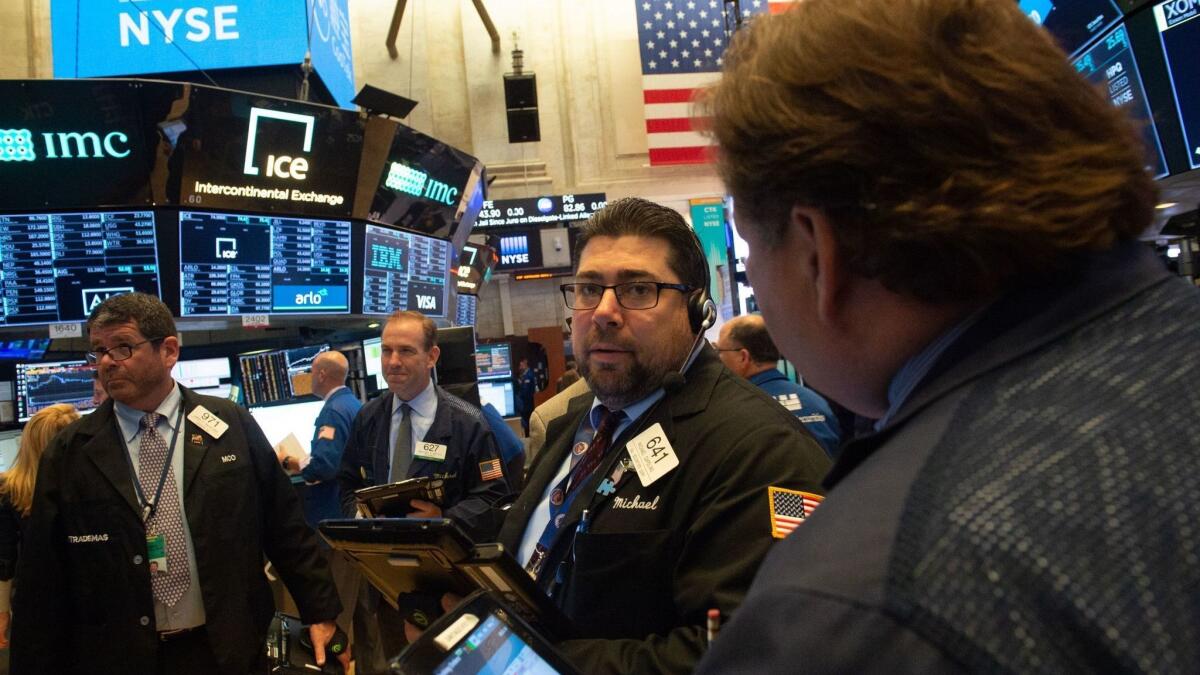Stocks close out best quarter in nearly 5 years on a quiet note

- Share via
U.S. stock indexes barely budged Friday as the stock market wrapped up its best quarter in almost five years. Tesla plunged after federal regulators moved to oust Chief Executive Elon Musk following his tweets last month about taking the electric-car maker private.
Healthcare companies did better than any part of the market during the third quarter, and they continued to rise Friday. Technology companies rose as chipmakers also traded higher. Facebook said it discovered a security breach that affected about 50 million accounts, and its stock fell again, ending its worst quarterly run in six years.
Global banks fell and European stocks skidded after Italy’s new government announced a big increase in spending. Italy’s main stock index fell almost 4% as investors worried that the government’s plan will lead to a clash with European Union leaders who want Italy to reduce its debt level.
Through the third quarter, pain in other markets led to gains for U.S. stocks, and that was true again Friday. The Standard & Poor’s 500 index had a quarterly gain of 7.2%, its biggest increase since the end of 2013.
One reason is that investors are worried about other regions, especially emerging markets. The currencies of Turkey and Argentina both dropped during the quarter, and investors worried that their currency and economic problems would harm the rest of the world.
“Investors do pivot to the U.S. when they have concerns about other regions,” said Marina Severinovsky, an investment strategist at Schroders. But emerging markets stocks have bounced back somewhat in the last two weeks, and Severinovsky said they might do better than U.S. stocks in the fourth quarter.
“The pessimism around those regions is probably too much,” she said.
The S&P 500 index edged down 0.02 of a point Friday to 2,913.98. The Dow Jones industrial average rose 18.38 points, or 0.1%, to 26,458.31. The Nasdaq composite inched up 4.38 points, or less than 0.1%, to 8,046.35. The Russell 2000 index of smaller-company stocks rose 6.04 points, or 0.4%, to 1,696.57.
The spending plans announced by Italy’s new government would expand its budget deficit. European Union leaders want Italy to bring down its debt level, which is the highest of any EU country after Greece.
Italy’s FTSE MIB sank 3.7%, and the German DAX gave up 1.5%. Other European nations’ stock indexes fell too.
Yields on Italian government bonds rose sharply, a sign of lower investor confidence in the government’s financial strength. The yield on Italy’s 10-year bond jumped to 3.14% from 2.89%, a huge move.
Italian bank UniCredit’s stock sank 6.7% to $12.96. Among European banks, Barclays slid 3.6% to $8.95. In the United States, Goldman Sachs fell 1.5% to $224.24.
Tesla suffered its worst loss in almost five years. It dropped 13.9% to $264.77 after the Securities and Exchange Commission filed a suit accusing Musk of committing securities fraud with his go-private tweets and asking the court to bar him from leading public companies.
Facebook fell 2.6% to $164.46 after it disclosed the data breach. That capped a brutal three months for social media companies. Facebook plunged 19% on July 26 after it said user growth had slowed, a drop that slashed the company’s value by $119 billion, its biggest single-day loss as a public company.
Facebook fell 15% in the third quarter, and Twitter dropped 35%, more than any other S&P 500 stock. Twitter was on a huge run until July 27, when it, too, reported weak user growth. Investors also worried about the possibility of greater regulation of both companies following hearings in Congress.
“In the U.S. and Europe these companies have largely been allowed, as they’ve grown to the size and scale and influence that they have, to self-regulate,” Schroders’ Severinovsky said. “I think that era is over.”
Japan’s Nikkei 225 jumped 1.4% after leaders agreed to open negotiations on a trade agreement with the United States. The move won Japan relief from the immediate threat of punitive tariffs on its auto exports to the U.S.
Energy companies gained ground as benchmark U.S. crude rose 1.6% to $73.25 a barrel. Brent crude, used to price international oils, rose 1.2% to $82.72 a barrel.
Wholesale gasoline rose 0.9% to $2.10 a gallon. Heating oil rose 1.2% to $2.35 a gallon. Natural gas fell 1.6% to $3.01 per 1,000 cubic feet.
Gold rose 0.7% to $1,196.20 an ounce. Silver jumped 3% to $14.71 an ounce. Copper rose 0.8% to $2.81 a pound.
Bond prices were little changed. The yield on the 10-year Treasury note stayed at 3.05%.
The dollar rose to 113.58 yen from 113.42 yen. The euro fell to $1.1610 from $1.1658.
UPDATES:
4:05 p.m.: This article was updated throughout with closing prices, context and analyst comment.
9:15 a.m.: This article was updated throughout with market prices and context.
This article was originally published at 9:10 a.m.
More to Read
Inside the business of entertainment
The Wide Shot brings you news, analysis and insights on everything from streaming wars to production — and what it all means for the future.
You may occasionally receive promotional content from the Los Angeles Times.










